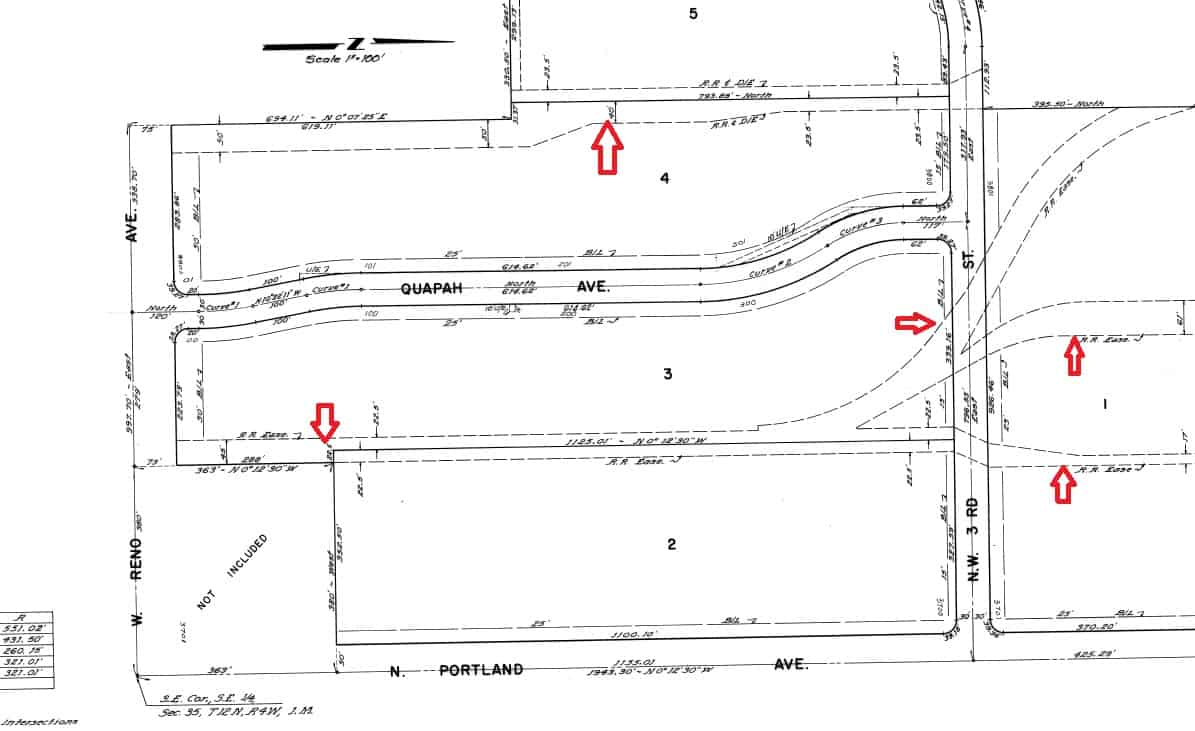I recently surveyed a lot in a 1967 platted subdivision bounded on the south by a railroad. The surveyor who drew the plat extended the lot lines to the center of the railroad row and included the row in the lot area. I have never seen anything like this and I believe it is a mistake. He shows the railroad to have a 100' row, which I would consider very typical. I would post the plat, but I can't seem to post pictures here.
Has anyone here ever seen a railroad on property that could be privately owned or seen property lines extend into the railroad row? This is a fairly heavily used line, not a spur.
OK. I'll open the can of worms - is the railroad an easement or fee simple or ........... ?
Brian Allen, post: 367319, member: 1333 wrote: OK. I'll open the can of worms - is the railroad an easement or fee simple or ........... ?
I believe it to be fee simple, but I haven't done enough research to prove it yet.
C Billingsley, post: 367317, member: 1965 wrote: I recently surveyed a lot in a 1967 platted subdivision bounded on the south by a railroad. The surveyor who drew the plat extended the lot lines to the center of the railroad row and included the row in the lot area. I have never seen anything like this and I believe it is a mistake. He shows the railroad to have a 100' row, which I would consider very typical. I would post the plat, but I can't seem to post pictures here.
Has anyone here ever seen a railroad on property that could be privately owned or seen property lines extend into the railroad row? This is a fairly heavily used line, not a spur.
Yes, I have seen that
There certainly are railroad ROWs that are easements. If you can find the document that created the railroad ROW you may find your answer.
I'll have to do some more research. From what I'm finding, this is not as uncommon as I thought.
Yes, some RR had the provision that when they ceased to maintain the line and pulled up tracks, the property was divided down the centerline to owners on each side.
The simple explanation is it's probably a shoddy survey.
In my area it is about 50-50 easement vs. fee.
Tommy Young, post: 367358, member: 703 wrote: The simple explanation is it's probably a shoddy survey.
Tommy, Tommy, Tommy,...so young to be so cynical.;-)
Tommy Young, post: 367358, member: 703 wrote: The simple explanation is it's probably a shoddy survey.
How can you say that without even seeing it?
C Billingsley, post: 367317, member: 1965 wrote: I recently surveyed a lot in a 1967 platted subdivision bounded on the south by a railroad. The surveyor who drew the plat extended the lot lines to the center of the railroad row and included the row in the lot area. I have never seen anything like this and I believe it is a mistake. He shows the railroad to have a 100' row, which I would consider very typical. I would post the plat, but I can't seem to post pictures here.
Has anyone here ever seen a railroad on property that could be privately owned or seen property lines extend into the railroad row? This is a fairly heavily used line, not a spur.
If it is really a "row" as you state there is really no issue here. A "Right-of-Way" is an easement to cross another's property, no more, no less.
Jack Chiles, post: 367380, member: 24 wrote: Tommy, Tommy, Tommy,...so young to be so cynical.;-)
I'm not nearly as young as I used to be.
There was a fellow down here that was a horrendous surveyor. To call him merely incompetent would be a compliment. I followed a survey of his where he called for PK nails set in the center of the track on the mainline from Memphis to Nashville. He did this because he was either too lazy or too incompetent to figure out the actual right-of-way.
Jim in AZ, post: 367382, member: 249 wrote: How can you say that without even seeing it?
1. I said "probably".
2. It's probably true.
Setting PK nails on the center line of a railroad track?? What a doofus?? Reminds me of the dimwit we had around here about 25 years ago who basically did the same thing but instead of PK nails he used railroad spikes. No..........they did not necessarily fall on railroad ties but in the spaces between them. Along with a million others that have been left behind through the decades. He didn't even paint them or do anything to make them unique in any way.
I went back and found the 1881 deed. It's difficult to read but seems to convey they "right of entry" upon the property, so I would have to say the 1967 surveyor of the subdivision was correct. I'm going to show the lines to the center of the railroad and break down the acreage separately.
Thanks for the feedback.




